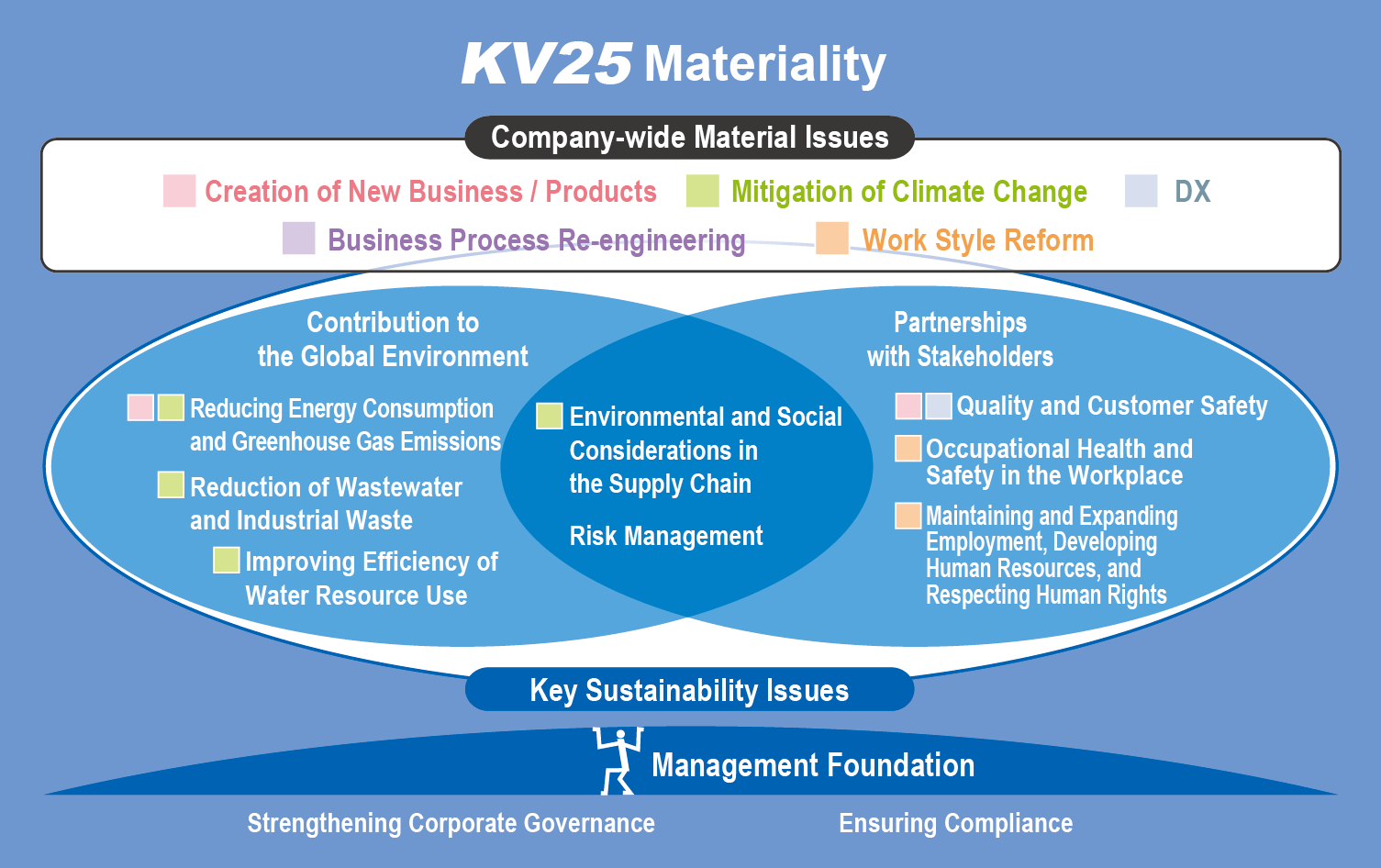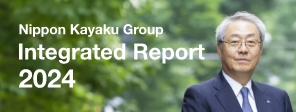Most important issues for corporate survival |
Ensuring Compliance |
 |
- Exercise thorough compliance, which is a basic principle for conducting corporate activities, and engaging in fair business operations
- Maintain and enhance an open corporate culture with a high sense of ethics
|
Number of serious compliance violations*1 |
0 |
0 |
0 |
- Zero serious compliance violations.
- FY2024's mandatory compliance training took the theme of "Workplace Communication," and was delivered to all domestic group companies.
- We spoke to overseas group companies without a Compliance Whistleblower Hotline and ensured such hotlines were set up. We aim to expand hotline use through increasing awareness and training in FY2025.
|
| Compliance training take-up rate |
100% |
96% |
97.7% |
| Percentage of group companies with compliance / whistleblowing hotlines |
100% |
83% |
100% |
| Strengthening Corporate Governance |
- Strengthen corporate governance of the entire group and manage in a highly transparent and sound manner
|
Number of times that the assessment on the effectiveness of the Board of Directors meetings is evaluated |
Once per year |
1 |
1 |
- A Board of Directors Effectiveness Evaluation was conducted, the present situation grasped, issues extracted, and an action plan fixed. Improvements are currently ongoing.
- Action to Implement Management That Is Conscious of Cost of Capital and Stock Price
- An Effectiveness Evaluation of the Audit & Supervisory Board was conducted.
|
| Number of times internal business audits are performed by the Audit Division |
60 times in four years |
17 |
12 |
Most Important Issues |
Quality and Customer Safety |
 |
- Enhance our quality control and quality assurance systems by continuously improving our quality management system and ensuring thorough quality-related governance
- Implement quality management, improve production efficiency and reduce process abnormalities through digitalization
|
Number of serious complaints by customers*2 |
0 |
0 |
0 |
- Our "Quality Month" of November adoped the theme of "The Conversation Technique for Accelerating Team Growth: Unravelling the Psychological Mechanism behind Quality Defects," and saw us stage a seminar on eliminating quality defects
|
| Number of serious quality process abnormalities in processes*2 |
0 |
0 |
1 |
| Environmental and Social Considerations in the Supply Chain |
    |
- Practice supply chain management with consideration for environmental and social aspects, based on the Sustainable Procurement Guidelines
|
Response rate for confirmation of consent to Sustainable Procurement Guidelines |
(Non-consolidated) 90% |
(Non-consolidated) 91% |
(Non-consolidated) 91% |
- FY2024 saw us survey 530 companies from which we had procured raw materials in FY2023, as well as 23 new suppliers from FY2024 based on Sustainable Procurement Guidebook contents. We received responses from 502 companies
- As no Sustainable Procurement Survey responses revealed suppliers to be causing harm to either human rights or the environment, it was deemed unnecessary to submit an Improvement Request form
|
| Formulation and implementation of improvement plans using questionnaires to suppliers |
(Non-consolidated) Progress disclosed |
Published in Topics |
Published in Topics |
Reducing Energy Consumption and Greenhouse Gas Emissions
Reduction of Wastewater and Industrial Waste
Improving Efficiency of Water Resource Use |
     |
- To achieve our FY2030 Environmental Targets by promoting energy-saving and global-warming response initiatives.
- To extract issues and clarify our strategies in order to achieve carbon neutrality by FY2050.
|
Greenhouse gas emissions
(Scope 1+2) |
(Target achieved in FY2030)
Under 70,598 tons (a reduction of over 46% on FY2019)
(Target achieved in FY2024)
Under 111,838 tons |
102,704
t-CO2 |
111,102
t-CO2 |
- We received our first A-List Rating in the CDP's Climate Change Field
- Promotion of MFCA and solar-powered PPA models were sequentially introduced
- Emissions increased for every item due to increased production volumes, but recycling rates and zero-emission rates still improved
- Environmentally-friendly products and technologies are being developed
【Safety Systems Business】
KMY commenced production of a light cylinder inflator (new generation inflator) whose CO2 emissions are 30% down on previous generation inflators.
A green propellant MGG was developed.
【Functional Materials Business】
A prototype of a CFRP/GFRP-use thermosetting resin targeted for use in aircraft was tested and assessed on a real aircraft.
Development of a biofuel-containing thermosetting resin that is high-temperature resistant and highly reliable.
【Color Materials Business】
Development of industrial-use inkjet ink (for coated paper and soft packaging).
Expanded sales of developers for phenol-free thermal paper.
【Catalysts Business】
Advancement of joint-development of a hydrogen-producing catalyst.
Development of a catalyst using materials informatics techniques which contributes to reducing amounts of, and improving yields from, raw materials used.
Development of a catalyst to manufacture basic chemicals such as propylene from biofuel.
【Pharmaceuticals Business】
Promoted the adoption of materials posing lesser environmental burdens in response to moves towards resource conservation in the field of packaging. |
| VOC emissions |
(Non-consolidated) Disclose results |
(Non-consolidated) 32.9 tons |
(Non-consolidated) 60.3 tons |
| COD emissions |
(Non-consolidated) Disclose results |
(Non-consolidated) 210.9 tons |
(Non-consolidated) 222.2 tons |
| Total waste output |
(Non-consolidated) Disclose results |
(Non-consolidated) 20,974tons |
(Non-consolidated) 28,225tons |
| Recycling rate |
(Non-consolidated) 80% or higher |
(Non-consolidated) 83.8% |
(Non-consolidated) 86.5% |
| Zero emission rate |
(Non-consolidated) 1% or less |
(Non-consolidated) 0.68% |
(Non-consolidated) 0.6% |
| Goal setting in line with SBT and consideration and implementation of specific measures |
Progress disclosed |
Medium-term Environmental Targets revised to 1.5℃ scenario |
Published in Topics |
| Disclosure in line with TCFD recommendations |
Progress disclosed |
Information disclosed |
Information disclosed |
| Develop products and technologies with consideration for environmental issues |
Progress disclosed |
Published in Topics |
Published in Topics |
Important Issues |
Occupational Health and Safety in the Workplace |
  |
- Strengthen the foundation for safe operation by thoroughly enforcing basic rules on safety and health and improving equipment and work procedures
- Implement health and productivity management and provide a workplace environment with a healthy work-life balance where employees can work with enthusiasm
|
Number of serious accidents*3 |
0 |
0 |
0 |
- No serious accidents within Nippon Kayaku (non-consolidated), including on the sites of group companies and partner companies
- Continued accreditation as a Health and Productivity enterprise. To keep this up, we continue to encourage employees to maintain and improve personal health
- Although overall paid leave take-up targets have been met, take-up rates for management have fallen slightly short. We will continue to spread awareness via our intranet and get HR managers for each business site to proactively call for leave to taken, as well as set up paid leave promotion days. As a new initiative, we have prepared a paid leave plan of 5 days or more (the Yu You Plan) for each employee, and circulated around their workplace
- Periodical health check take-up rates remain at 100%
- Our second Employee Engagement Survey has been carried out. Our overall score was 48.4, an improvement on last year but still short of the national average. Companywide, while we scored highly for "manager support" and "workplace unity", we tended to score lowly on "appropriate recruitment and placement" and "prospects for busines growth and business future." Each workplace has set up an action plan aimed at increasing employee engagement, and is undertaking improvement activities
|
| Acquisition of certifications under the Certified Health & Productivity Management Outstanding Organizations Recognition Program (Large Enterprise category) |
(Non-consolidated) Continued certification |
(Non-consolidated) Continued renewed |
(Non-consolidated) Continued renewed |
| Percentage of paid leave taken |
(Non-consolidated) 70% or higher |
(Non-consolidated) 72.8% |
(Non-consolidated) 73% |
| Percentage of employees who take mental health training |
(Non-consolidated) 100% |
Year 1 of our 3-year plan has proceeded as intended |
The second year of the three-year plan has proceeded as planned |
| Percentage of employees receiving regular health checkups |
(Non-consolidated) 100% |
(Non-consolidated) 100% |
(Non-consolidated) 100% |
| Ascertaining and improving employee satisfaction through questionnaire surveys |
(Non-consolidated) Progress disclosed |
Publishes in Topics |
Publishes in Topics |
| Maintaining and Expanding Employment, Developing Human Resources, and Respecting Human Rights |
    |
- Promoting diversity and inclusion through the recruitment of diverse human resources, effective HR assignment and exchanges
- Pass down and strengthen technical capabilities in monozukuri (manufacturing) and achieve globalization in human resources through ongoing human resource development
- Engage in business operations that pay care and consideration to the human rights of employees and all other people involved in the supply chain
|
Percentage of female employees in management posts*4 |
(Non-consolidated) 10% or higher |
(Non-consolidated) 8.8% |
(Non-consolidated) 8.3% |
- In each workplace, we are selecting female candidates for managerial positions, confirming their managerial intentions via interview, and delivering systematic development training. In order to change attitudes, we have also held a panel discussion involving female managers and urged women to challenge for management roles. We have also increased the percentage of women recruited. (New female hires are up by 9.2 points on the previous FY, while career female hires are up by 4.3 points)
- With the aid of specialist support and advice, we are preparing better work introductions and working environments for disabled people, and continue to promote disabled hires as well as expanded job opportunities. Our actions going forward will see us fix Key Initiative Business Sites on which to expand recruitment and prepare a suitable working environments. We shall also link up with a specialist support school to further boost recruitment and continually strengthen working environments
- We have conducted e-learning session on the Nippon Kayaku Group's Revised Human Rights Policy. This not only enabled us to republicize the policy, but enhance big-picture understanding of the human rights that businesses should respect, relevant initiatives, and our business activities will be impacted
- Based on the risks identified as requiring priority measures from Nippon Kayaku employees as identified in our Human Rights Risks Impact Assessment, we are continually implementing corrective measures to reduce and eliminate human rights negatives
|
| Percentage of employees with disabilities |
(Non-consolidated) Achieve legal minimum employment rate |
(Non-consolidated) 1.93% |
(Non-consolidated) 2.11% |
| Amount invested in education and training per employee |
(Non-consolidated) Disclose results |
(Non-consolidated) 76,565 yen/person |
(Non-consolidated) 72,015 yen/person |
| Training hours per employee |
(Non-consolidated) Disclose results |
(Non-consolidated) 17.7 hours |
(Non-consolidated) 15 hours |
| Number of training sessions held on human rights |
Once or more per year |
2 |
1 |
Human rights due diligence:
human rights impact assessment rate |
(Non-consolidated) FY2022: 100%
(Consolidated) FY2025: 100% |
Human rights risk assessments and risks requiring priority measures identified in sessions laid on for Nippon Kayaku Group employees |
We are continuing to implement corrective measures for risks requiring priority measures to reduce and eliminate human rights negatives. |
| Risk Management |
|
- Respond to various business-related risks and ensure business continuity by maintaining production systems, ensuring the proper procurement of raw materials, and strengthening measures against disasters
|
Implementation rate of risk control activities for business, etc., and top five risk control activities |
100% |
100% |
100% |
- Top Five Risk Control Activities conducted at seven domestic factories and all group companies. (The lack of outstanding human resources emerged as an increasing risk-trend)
- Certain domestic and overseas business sites picked up for hearings related to their Top Five Risks
- BCP drill conducted at several sites within the Fine Chemicals Business Unit, based on a Kanto-region-epicentered earthquake scenario
- BCP drills conducted at Chinese group companies
|
| Number of BCP drills conducted |
Once or more per year |
3 |
3 |



